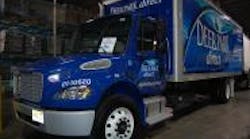“This is the best of both worlds – advanced clean diesel engines with near zero emissions coupled with hybrid powertrains that capture and recycle energy of the truck operation.” – Allen Schaeffer, executive director, Diesel Technology Forum
So I attended the Maryland Hybrid Truck Initiative’s (MHTI) "ribbon cutting” ceremony this week at a Nestle Waters North America (NWNA) depot just south of Baltimore – an event celebrating the first “wheels on the ground” of 143 hybrid trucks among five national fleets that will be placed into operation in and around the state of Maryland.
The MHTI program, as you might guess, is a complex “public-private” partnership that uses federal grants to help spur the adoption of new technology – in this case, hybrid trucks.
MHTI used $5.9 million in grant funding from the American Recovery and Reinvestment Act (also known as the “stimulus bill”) through the U.S. Department of Energy (DOE) to help offset the incremental cost to purchase and deploy these 143 diesel-electric and hydraulic hybrid trucks built by Daimler Trucks North America (DTNA); specifically Freightliner Business Class M2e and Freightliner Custom Chassis walk-in van models.
The way it works is that the five fleets in question pay the base sticker price for these 143 trucks, with the $5.9 million federal grant money covering the “incremental” cost for the hybrid systems. Averaged out, that’s just under $42,000 per vehicle – not chump change in the fleet world.
But as Dennis Smith, director of the DOE’s national clean cities program, explained without this grant money, most fleets are reluctant to experiment with new technologies like hybrid trucks because they just cost too much. So government steps in help “seed” the market, if you will, giving these technologies a chance to prove themselves.
Then, as volumes grow, the government funding goes away as economies of scale have (hopefully) stepped in to bring down the overall cost of the hybrids to reach an acceptable return on investment (ROI) calculation for fleets.
[Smith talked about some of these factors – as well as the fuel savings and emission reductions these 143 trucks should generate – in his remarks at the MHTI event.]
I talked with Mark Lampert, DTNA’s senior vp-sales and marketing, about this and he explained that it’s a three stage process spanning many years of effort.
“This is really the first stage; a government funding effort to pick up the incremental cost of hybrid trucks so we can get them into the hands of fleets,” he told me.
“The second stage is marked by leveraging the efficiencies hybrid technology brings to fleet operations, demonstrating the benefits it can bring to a fleet’s bottom line,” Lampert noted. “The third and final stage is building broader demand for hybrid trucks based on those demonstrated efficiencies, creating economies of scale to bring the cost of such vehicles down so we can eliminate the need for government funding.”
[Lampert also talked about how hybrid technology functions within a truck to save fuel at the MHTI event; you watch some of his speech below.]
At the end of the day, though, it’s the fleets that will make – or break – this drive to “hybridize” commercial trucks. Jeff Bush, national fleet purchasing manager for Nestlé Waters North America (NWNA) told me that right now the ROI calculation just isn’t there because hybrid technology is just so pricey.
Yet NWNA – which operates a fleet of some 4,000 vehicles – isn’t shying away from these systems and not only because it can get some help paying from them with grant money. Bush explained in his comments the MHTI ceremony that hybrids can, in some cases, offer a competitive advantage in the marketplace.
Bush is also acting as the “spearhead” of sorts for NWNA in terms of acquiring alternatively-powered vehicles, including diesel-electric hybrid beverage delivery trucks, compressed natural gas utility customer service vans and 32 hydrogen fuel cell forklifts.
[He’s also very practical when it comes to this technology, too – no doubt in part due to his 24-year career in the U.S. Marine Corps as a fixed wing aviator. There’s no room for flights of fancy in that line of work.]
All five fleets involved in the MHTI project – ARAMARK, United Parcel Service, NWNA, Sysco Corporation, and Efficiency Enterprises – want to see benefits from hybrids of course from a fuel savings and emission-reduction perspective.
And these 143 trucks should reduce consumption of conventional petroleum products by 138,420 gallons per year, while slicing oxides of nitrogen (NOx) emissions by more than 67,747 lbs. annually along with greenhouse gas (GHG) emissions cuts of 652,748 lbs. per year as well.
Will these trucks produce those expected savings? They’re only beginning to hit the pavement now, so we won’t know for sure for some time yet.




